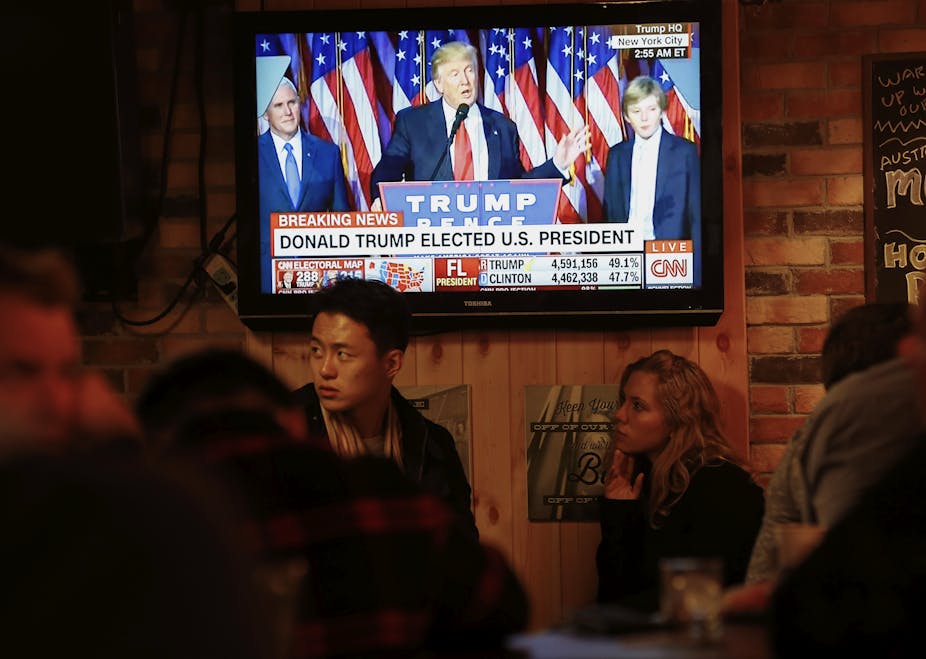Much is being said in the immediate aftermath of Donald Trump’s election victory over Hillary Clinton. Most of what is being said is negative, but also, necessarily, speculative. It is a little early to go beyond this speculation – but a more analytical viewpoint might suggest that the world is not about to end and that World War III is not about to break out.
While lacking in political experience, Trump is hardly lacking in business experience, acumen or success. His much-quoted stances on making “America great again” and on reducing America’s role as a global policeman have played out well with his supporters – but in the cold, hard light of day, how many of his suggestions are possible and would a more isolationist US thrive economically or in security terms?
The foundation of Britain’s empire and its enormous wealth through the 19th century was its position as a maritime trading nation – a role that the US assumed in the aftermath of World War II. America has traded with the world – or the “free world” at least – happily and to great effect. She has exported, not only her goods, but her values, ideals and products around the world. America will need to carry on trading, accepting immigration and operating within this construct of an interdependent, interconnected world just to survive, let alone thrive, economically – and economic security is at the heart of much of the Trump message.
As a businessman he knows this, just as he knows that pulling low-skill, labour-intensive industries such as automobile manufacture back to the US is simply not going to happen. Moreover, such is the power of the global financial marketplace – and New York is such an important player – that an isolationist America simply does not make sense. It would represent a severe security challenge to the the nation – in terms of economic interdependency, the world is very different now to the 1920s.
Fortress America
This is even starker when one looks at defence. Yes, in a highly simple analysis America could metaphorically pull up the drawbridge: pull all her troops back, close bases around the world and hunker down behind her enormous nuclear weapons shield. In the very short term, this may sound appealing. But all too soon the second-order effects would start to appear. Take the Korean peninsula: without the presence of US troops, would Kim Jong-Un feel emboldened to make even more trouble, or even invade, his southern neighbour?
If that were to happen, how would that impact America’s standing in the region, and thereby her trade? Withdraw from the Gulf and where would Saudi Arabia and the countries of the Gulf Cooperation Council turn – and again, how would that play out in economic terms for the US, the wider Western world and for oil prices? The examples are numerous but all point the same way: America’s local presence from Japan to Europe allows her influence, which in turn buys trust, which leads to trade.
And what of NATO? Trump has questioned whether he’d be willing to come to the aid of a fellow NATO member, but how would that play out in real terms and would a Trump presidency really wish to open the door to a more resurgent and aggressive Russia?
Memories of the Soviet crushing of the uprisings in 1967, the “Prague Spring”, are still fresh in the minds of many in Central and Eastern Europe: a similar incursion, perhaps against a backdrop of a disunited NATO and rising nationalism from the Russian minorities within the Baltic states would so undermine America’s standing – and thereby trust and faith in her – that it would take at least a generation to recover.
Against such a scenario, the warm words of congratulations by NATO’s secretary-general, Jens Stoltenberg, are to be welcomed – not least as an acceptance that NATO (and other, similar international organisations) must seek not only to engage with the new political leadership in the US, but also ensure that they in turn remain engaged.

America is, by some margin, the world’s largest manufacturer and supplier of defence materiel – from work in the domain of cyber security, through the supply of modern combat aircraft, to the supply of simple bullets. Retreat to fortress America and this trade would be in immediate jeopardy, resulting in significant threat to those regions where defence spending plays such a significant role in the local economy (13% of GDP in Virginia: 11% in Hawaii). This would also diminish America’s presence and standing.
Real-world priorities
According to US military doctrine a state has four levers of power: diplomacy, information, military and economic. What is striking, though, is how these are themselves interconnected – they all have economic effects, either directly or indirectly. For all of the rhetoric we have heard from Donald Trump, realpolitik will rear its head – and economic pressures and requirements will soon prove to be limiting factors that will push his presidency back towards the centre ground.
Fear is a powerful emotion, but one that needs to be treated with significant caution. There may be more uncertainty that comes with the Trump administration, but we need to maintain balance – the realities of today’s global economies are such that even Donald Trump must accede to them. And tomorrow, the sun will rise in the East and set in the West, just as it always has.

